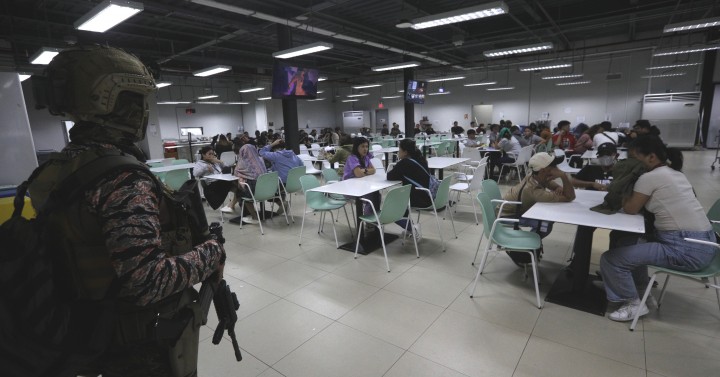Table of Contents
Headline: Putin Revises Nuclear Strategy Amid Rising Tensions
In a significant escalation of military posturing, Russian President Vladimir Putin has announced changes to Russia’s nuclear policy, directly impacting the fragile security landscape in Europe. As Western nations, including the United States and the United Kingdom, provide Ukraine with advanced missile technology, experts are questioning how Russia might retaliate. This development comes at a time when NATO’s support for Ukraine is unwavering, and European nations are bracing for potential nuclear threats.
The Changing Landscape of Nuclear Policy
On [insert date], Putin’s government revealed modifications to its nuclear doctrine, drawing global attention and concern. This announcement aligns with increased military aid to Ukraine from Western allies, raising fears of a renewed arms race in Europe. Political analysts emphasize the need to understand these shifts in policy, particularly as tensions deepen.
The new nuclear rules seem to reflect Putin’s response to the perceived threat posed by Western involvement in the Ukraine conflict. According to a Kremlin spokesperson, these changes underscore Russia’s commitment to its national security and act as a deterrent against perceived aggressors. "We must ensure the safety of our nation and respond firmly to any attacks on our sovereignty," stated Dmitry Peskov during a recent press briefing.
Context of the Announcement
The timing of this announcement is critical. The United States and the United Kingdom’s ongoing military support to Ukraine has intensified fears of escalation. In an article by RTÉ News, experts are pondering how Russia might retaliate if Ukraine utilizes U.S. and U.K.-provided missiles to strike deep into Russian territory. The Guardian highlights that such a scenario could lead to severe consequences, potentially drawing NATO further into direct confrontation with Moscow.
Germany’s Foreign Minister, Annalena Baerbock, recently emphasized that Germany will not succumb to Russian intimidation. Her remarks reinforce a unity among European nations against Russia’s nuclear threats, highlighting the geopolitical dynamics at play. "We must stand firm against all forms of coercion," she declared, demonstrating European resolve.
Understanding the Potential Impact
The implications of Putin’s recalibrated nuclear strategy could be profound, touching various spheres—from military tactics to global diplomatic relations. As nations consider the potential for conflict, the debate among experts about the possibility of nuclear engagement is intensifying. Some analysts, like those quoted by Sky News, warn that Russia’s military doctrine could allow for the use of nuclear weapons in regional conflicts, effectively changing the rules of engagement.
The notion that nuclear weaponry could be leveraged as a first strike option is alarming, but essential for policymakers to grasp. Historically, nuclear weapons have served as deterrents; however, they are now increasingly viewed through the lens of potential tactical use, especially in the context of Putin’s latest rhetoric.
What Lies Ahead?
In response to these developments, NATO is reassessing its strategies in Eastern Europe. Military analysts suggest a renewed focus on deterrence and defense strategies that could mitigate the threat of nuclear escalation. As discussions revolve around reinforcing NATO’s eastern flank, the alliance must also consider its nuclear posture in light of Russia’s unpredictable strategies.
Key Takeaways:
- Putin’s changes to nuclear policy reflect a deterrent response to Western military support for Ukraine.
- The potential for nuclear engagement as a military strategy is a pressing concern for experts.
- European nations are rallying against Russian intimidation and showcasing their determination to support Ukraine.
Experts suggest that nations must prepare for various scenarios, emphasizing the importance of diplomatic channels alongside military preparedness. “Engagement, even when challenging, remains critical to avoid miscalculations,” noted Dr. Elena Averyanova, a noted political analyst.
A Call for Vigilance
As the situation evolves, the international community must maintain vigilance and strategic foresight. The implications of Putin’s announcement stretch beyond immediate military confrontation; they tie into a broader narrative of security, diplomacy, and international relations. As the United Nations and other diplomatic entities seek to mediate tensions, the ability to navigate this complex scenario will be critical for global stability.
As we move forward, these developments will undoubtedly shape not just the European security framework, but also the broader global landscape. It remains crucial for individuals and policymakers alike to stay informed and engaged with these pivotal issues affecting international peace and stability.
For further insights into the geopolitical implications of current events, explore our articles on NATO’s evolving strategies and Russia’s international relations.
In the face of rapidly changing dynamics, how do you think the West should respond to Russia’s nuclear strategy? Share your thoughts and engage in the conversation below.

**1. Introduction**
Q1: Given the new nuclear strategy unveiled by Russian President Putin, how do you think it could affect regional security and peace negotiations?
Q2: What are the potential consequences of a potential nuclear conflict between Russia and the United States or EU?
**2. Nuclear Policy and its Implications**
Q3: How has Putin’s recent announcement on nuclear policy changed the global nuclear landscape, and what are potential implications for the international community?
Q4: How do you think the shift in Russian nuclear policy could affect nuclear diplomacy and regional security cooperation?
**3. Importance of Understanding Shifts in Nuclear Policy**
Q5: Could increased military aid to Ukraine, potential escalation, and the changing NATO nuclear strategies indicate a side change in European security systems?
Q6: What have been the diplomatic implications stemming from Putin’s announcement and how might European nations balance it?
**4. Future Strategic Challenges**
Q7: As countries prepare for the potential confrontation with Russia, what unique strategic challenges do these developments pose for NATO?
Q8: How do you think such scenarios could alter international security discussions, and what role could the United Nations and other multilateral entities play in mediation and resolution?
**5. Global Perspectives**
Q9: What is the broader international response to Putin’s nuclear policy amendment, and how might it impact other nations’ foreign policies and alliances?
Q10: How can international organizations, including the United Nations and the International Atomic Energy Agency, contribute to peace talks and nuclear crime prevention?

